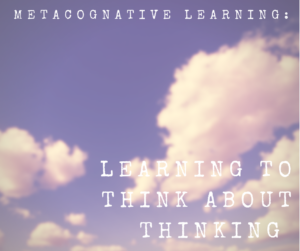5 Ways We Support Metacognitive Learning
The Journey of the Megacognitive Learner –
Metacognition is a term that refers to the process of deliberately thinking about one’s own thinking. It means being conscious of not only what you are thinking about, but having awareness of how you are processing the information with the intention of improving your learning. You will no doubt have heard JD say that we focus as much on process as content; metacognitive strategies are a really important element of how we educate our learners.

Really exciting research has shown that metacognition can be improved over time through practice and development. In fact, brain scans show more gray matter in the anterior prefrontal cortex (the area of the brain responsible for metacognition) in people who regularly engage in metacognitive strategies. Our Leelanau Learners come to our community with a variable range of metacognitive experiences. Some have attended schools in which metacognition is built into the culture; others have not encountered such strategies. Without metacognition, students can develop misconceptions about themselves and their abilities as learners. Through practice of these thinking strategies, students recognize that their academic struggles are skill problems, not intelligence problems!
At Leelanau, we expect our Metacognitive Learners to use planning when approaching a task, to monitor their own understanding of the process, and to evaluate their progress toward the end of a task. We help students reflect on their learning, building awareness of their own best strategies.
Here are 5 of the ways we support metacognitive learning at The Leelanau School.
- We explicitly teach students to define metacognition and to practice metacognitive strategies across subject areas. In the Learning Skills classes we observe not only what they do, but how students approach their assignments. It allows us to guide the development of their Learning Toolboxes, filling them with strategies and the judgement about when to use particular strategies.
- During weekly check-ins we ask students to reflect on how they are making progress in both their academic and community living goals. They identify problems and potentials for problems early and make a plan to address them.
- We give choices. Students help design their academic support. All students have access to the academic support from the Learning Commons, but the support is differentiated, tailoring it to their individual styles, needs, and goals. When students are genuinely invested in learning about a topic, they can maintain motivated attention longer term.
- We support social skills development in the moment. When need arises for social skills instruction, our faculty are prepared to work with the students involved to process the situation and offer mediation, support, coaching, and practice in healthy problem solving and conflict resolution strategies.
- We model higher order thinking strategies for our students. When adults make mistakes, it provides wonderful teachable moments as we stop ourselves, recognize our thinking, and talk through our thinking to correct the problem. What student doesn’t love it when a teacher makes a mistake? We highlight that everyone makes mistakes and that mistakes are best seen as opportunities to learn and improve.
Self aware thinking and problem solving has always been present in the Leelanau School’s philosophy, but only recently has the research emerged showing just how important metacognition is for helping students become independent, successful learners. When students become conscious of their thinking, they can make decisions about their own improvement and, often for the first time, have a sense of control over their academic careers.
Mindfulness Benefits For Students | The Leelanau School
[…] PIQUED YOUR INTEREST? You might also like our post 5 Ways We Support Metacognitive Learning […]